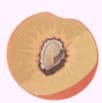Fruits & Seeds
Fruits & Seeds: Overview
This topic covers concepts such as epicotyl, hypocotyl, pericarp, plant embryo and dry fruits.
Important Questions on Fruits & Seeds
Give two examples of dry dehiscent fruits.
What are the Characteristic of Dry fruits.
Operculum is present in the majority of the dicot plants.
Name the protective wall of fruit, whether it is perisperm or pericarp.
Seeds develop from fertilized ovules.
Which ONE of the following pairs gives rise to fruit and seed, respectively, in a typical angiosperm plant?
Look at the given diagram and answer the following questions.

Name the different layer of a pericarp.
Seed coat is an outer protective covering of the seed.
Match the following lists:
| List - I | List - II | ||
| (A) | Cypsela | (I) | Jack fruit |
| (B) | Schizocarpic | (II) | Tridax |
| (C) | Caryopsis | (III) | Rice |
| (D) | Composite fruit | (IV) | Acacia |
The correct match is
The scar present on the seed coat is called
The most important foods are derived from:
Name the outermost layer of the seed coat.
Differentiate between aril and caruncle.
Match the part of flower/type of fruit in column I with structure/example in column II.
| Column I | Column II | ||
|---|---|---|---|
| a | Ovary | (i) | Groundnut, mustard |
| b | Ovule | (ii) | Guava, orange, mango |
| c | Wall of ovary | (iii) | Pericarp |
| d | Fleshy fruits | (iv) | Seed |
| e | Dry fruits | (v) | Fruit |
Identify if the following statements are true (T) or false (F) and choose the option accordingly.
(a) After fertilization, the ovary wall develops into a pericarp.
(b) In organisms with the diplontic life cycle, the zygote divides by meiosis to form haploid spores.
(c) Sexually reproducing organisms begin life cycle as a single cell zygote.
